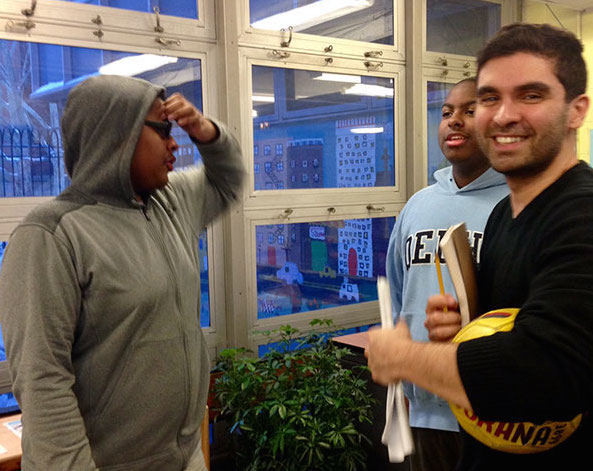Requiem For A School That Works

David Baiz, right, with students
Eight years ago, I had a front-row seat at the birth of a new small school in East Harlem. Global Technology Preparatory was crafted by its founding teachers over Sunday brunches at the home of Jacqueline Pryce-Harvey, who would go on to become the school’s assistant principal.
Featuring, among other things, a one-to-one laptop program for its poor students and an after-school program—the result of a partnership with Citizens Schools, a Boston-based nonprofit—Global Tech, as it is known, came to be heralded as one of a slew of innovative Bloomberg-era schools.
By most measures, Global Tech is a school that works. During the Bloomberg years, Global Tech got mostly “A’s” on its school report cards. Under the school’s most recent “quality snapshot,” which measures schools on seven characteristics, Global Tech received a “good” on five, and an “excellent” on two—trust and leadership. Parents and teachers rave about the school. And next school year, it was to become a “host school” in schools Chancellor Carmen Farina’s signature Learning Partners Program, which is “designed to promote interschool collaborative learning and leverage the rich reservoir of expertise that already resides within our school communities,” according to the education department website.
I’ve written before about Global Tech, a Title 1 school with a special needs population that, historically, has topped 35 percent of the student body—most recently about its first class of students, many of whom were getting ready to head to college. I’ve also written about David Baiz, the award-winning teacher who was handpicked by Global Tech’s founding principal to become her successor.
Now Alexandra Estrella, the District 4 superintendent, has shown Baiz the door in what is expected, by most educators who know both Global Tech and the district, to mark the beginning of the end for the school. Last week, the staff sat stunned and teary-eyed, when Baiz announced at the weekly staff meeting that he would not be returning after spring break.
“One thing I've been really proud of—I feel like we've created something special in East Harlem,” Baiz told his staff. “Not every school is like this, in New York City, in East Harlem, in tough neighborhoods. You should be very proud.”
But, in interviews with half-a-dozen current and former staff members, several used the word “dead” or “dying” to describe what they see happening to the school.
“There was so much magic here; the way people worked together, how hard they worked,” said one staff member who did not want to be identified and caught herself speaking about the school in the past tense. “There is already tremendous upheaval in the lives of our kids who desperately need stability,” she added, noting that she expects more uncertainty in the coming months.
“The real tragedy of this is that David was the right guy at the right time,” notes Nick Siewert, a senior educational consultant with Teaching Matters who has worked with the school for several years. Baiz was committed to the school's social-justice mission, adds Siewert, but he is also “a systems-and-structures guy” who believes it is important for Global Tech and its students to do well by “measurable results.” Among other things, Baiz introduced a system of interim assessments designed to help teacher teams analyze specific student weaknesses and improve their practice.
One of the first schools in the Bloomberg-era iZone—in fact one of the few to survive the early years of that experiment—Global Tech also traces its lineage to the era of collaboration and teacher-leaders that flourished in District 4 under Tony Alvarado and Debbie Meier, beginning in the 1970s, and was, to a limited degree, revived under Bloomberg.
That legacy of grassroots leadership and collaboration, which was intended to foster creativity and innovation, is now widely seen as endangered—not just at Global Tech, but throughout the city. “This is a successful school; and yet, this is the kind of talent the DOE doesn’t want to retain?” said Chrystina Russell, the former principal referring wryly of Baiz’s ouster. “Is there no cause for pause?”
Indeed, Global Tech may turn out to be among the first Bloomberg-era small schools to be dismantled by the de Blasio-Farina administration. Those close to the school see Global Tech as a victim of an expanding bureaucracy where “who you know matters more than what you know.” Farina, the schools chancellor, has said she plans to merge dozens of small schools, arguing that mergers will create economies of scale and allow schools to offer more programs.
However, Global Tech had already punched above its weight thanks to a slew of partnerships. In addition to Citizen Schools afterschool offerings, under Baiz, the program’s apprentice teachers have offered an extra daily guided-reading program during the school day for every child. Partnerships with Cornell Tech and Google have helped Global Tech develop a course in software coding. For the second year, Global Tech is sending students to Bridge to Enter Advanced Math, a residential college-based summer program for seventh-graders. And following the standardized-testing season each spring, the school’s challenge-based learning modules allow students to work on everything from fashion design to a theatrical production.
Yet, Global Tech has known for nearly two years that its days might be numbered. Soon after Baiz become principal, in 2013, he learned that the superintendent was considering merging Global Tech, which has never had more than about 175 students, with P.S. 7, the K-8 school that shares its building. Russell and other friends of Global Tech within the education department urged Baiz to fight for the school; in what proved a short-lived victory, the principal of P.S. 7 moved to a job at DOE headquarters, and Estrella tapped Pryce-Harvey, Global Tech’s assistant principal and Baiz’s friend, to be the interim-acting principal.
Then, last summer, Baiz learned that Estrella had turned down his tenure application; under education department rules, there was a good chance that he would lose his principalship. A few months later she overruled his tenure recommendation for a respected Global Tech teacher—a Math for America master teacher for science who also holds a special-education certification.
Getting rid of Baiz appears to be a first step in consolidating the two schools in the East 120th Street building they share, under a principal hand-picked by Estrella. Pryce-Harvey will retire from P.S. 7 this year; her successor has already been chosen. While Estrella urged Baiz to leave early, assuring him that she had selected a successor for Global Tech, it turns out that she is moving one of her lieutenants, Ellen Johnson Torres, a teacher evaluation and development coach, into the job temporarily—another sign, education sources say, that the school will be merged with P.S. 7.
Estrella’s office referred interview requests to the education department, which did not respond to a phone message.
Despite the turmoil, several teachers at the school, which is also known for low teacher turnover—not a single teacher left last year—are clearly reluctant to leave. “I love these kids and I love East Harlem,” said Sage Hunter, the science teacher whose tenure application was turned down, adding that she wants to see her seventh grade students through to next year’s graduation. Kayla Hamilton, who started out as a Citizen Schools apprentice teacher seven years ago, said, “I’m going to be open-minded. As long as they keep our kids number one, I’m OK. But if I feel I can’t do what’s best for our students...”
Several other teachers, though, are updating their resumes. Thanks to Estrella’s decision to push Baiz out early, they have the entire upcoming so-called open-market period to look for new jobs within the department.
The one thing no one is worrying about is Baiz’s future. Last month, Baiz was accepted into Harvard University’s Doctor of Education Program, perhaps the most prestigious and selective program for educators in the country.
“He’s good enough for Harvard, but not for East Harlem,” one Global Tech teacher said of Baiz.
***
Andrea Gabor is the Bloomberg Professor of Business Journalism at Baruch College/CUNY and is working on a new book on education reform. On Twitter @aagabor.
***
Have an op-ed idea or submission for Gotham Gazette? Email This email address is being protected from spambots. You need JavaScript enabled to view it.
New Yorkers Deserve Answers About the State’s Nuclear Bailout

Climate change is a serious threat to New York. With so much of the state’s population, infrastructure and economic activity crammed into the coastal communities of the New York metropolitan area, sea level rise and increasingly intense hurricane seasons spell certain disaster in the long term.
In light of this, I’m sure that I share the concerns of many New Yorkers in expressing my disgust with President Trump’s executive action aimed at dismantling Obama-era climate regulations. That’s why it’s more important than ever to take action at the state level to combat this growing threat.
New York has already developed an ambitious Clean Energy Standard with a “50 by 30” goal of generating at least 50% of New York State's electricity from renewable energy sources by 2030, and reducing carbon emissions by 40% by that same year. These are important efforts that should be undertaken transparently and with the full cooperation of both government and the general public.
Sadly, that has not been the case. Last month, the Assembly Committee on Corporations, Authorities and Commissions, which I chair, held a joint hearing with the Committees on Energy, Consumer Affairs and Protection, and Environmental Conservation to examine state plans around nuclear power plants and utility costs for New Yorkers.
Specifically, our hearing was intended to provide New York ratepayers with the opportunity to learn more about the state’s plan to offer Zero-Emissions Credits (ZECs) to upstate nuclear power plants and the program’s potential impact on utility costs. We invited the Public Service Commission (PSC) to testify about its controversial plan to provide ZECs. However, by failing to even appear before the committees, PSC officials continue to keep ratepayers in the dark on some of the program’s most pressing and questionable aspects.
The PSC even added insult to injury by sending a letter to me and my three fellow committee chairs giving conflicting reasons for its absence. In its letter, the PSC accuses us of not giving them sufficient notice for the hearing, while simultaneously blaming pending lawsuits brought by environmental groups against the Clean Energy Standard.
This is exactly the kind of half-baked reasoning we’ve seen recently from our federal government: blame as many groups and individuals as possible and see what sticks. The simple fact is that New Yorkers deserve transparency on such a vital issue, and yet the PSC is offering us just the opposite.
The Trump comparisons don’t end there. The plan would also mandate companies under the PSC’s jurisdiction to purchase these credits to subsidize four unprofitable upstate nuclear plants, all owned by the Exelon Corporation. The cost to ratepayers is estimated to total as much as $7.6 billion over the next 12 years. This is corporate welfare, pure and simple, with downstate ratepayers footing 60% of the bill and getting zero in economic benefit. The President would be proud.
My colleagues and I continue to demand that the PSC testify on these matters, and we’re prepared to fight until we get answers to our questions: How were these plants determined to need the subsidies? What are the potential taxpayer-funded profits for this private corporation? New York ratepayers deserve to know.
It's time we shine a light on our state’s electrical network, and ensure that the term “green energy” applies to the environmental impact for our state, not the economic impact to a company’s bottom line.
***
Assembly Member Jeffrey Dinowitz (D – Bronx) Chairs the Assembly Committee on Corporations, Authorities and Commissions. On Twitter @JeffreyDinowitz.
***
Have an op-ed idea or submission for Gotham Gazette? Email This email address is being protected from spambots. You need JavaScript enabled to view it.
Closing Rikers: Good Politics, Bad Policy

Mayor de Blasio on Rikers Island (photo: Mayor's Office)
Mayor de Blasio's announcement that the city intends to close Rikers Island jails in 10 years has met a mainly celebratory response, even from seasoned criminal justice reformers. We advise that they, after years of good work in exposing the debilitating and sometimes brutal conditions in the Rikers jails, take a deep breath and apply a critical eye.
The mayor's broad plan seems at least in part based on the recommendations of a blue-ribbon commission chaired by former New York State Chief Judge Jonathan Lippman, and will include replacing the facilities on Rikers with small jails built in different parts of the city. The Lippman Commission pegged the estimated cost at $10.6 billion, with annual cost savings then to follow. De Blasio, who has strayed away from details so far, is simply promising the outcome of closed jail complexes on Rikers and at least a couple of new jails elsewhere.
While de Blasio may see this move as good politics in an election year when he wants to shore up his liberal base, it is bad policy. Here's why:
*The 10-year goal -- far off in any context, but in politics, a lifetime -- is hardly a serious aspirational target, especially when de Blasio, even if he wins re-election, will have been out of office for years by the time Rikers would be slated for closure. The next mayor will face the large bulk of the untoward financial or bureaucratic or political consequences of the proposal.
*Any plan to close Rikers that includes the construction of new jails is a substantive mistake. Based on the recent history of municipal capital projects here in New York, we can expect that it will take longer to construct the new jails than currently thought and that it will cost even more than than the $10.6 billion projected.
*There's no reason even to be certain that conditions of confinement will improve significantly since the new facilities will operate with the same correction officers and jail culture that, in effect, contribute directly to the deplorable environment on Rikers today. Akeem Browder, the brother of Kalief Browder, whose suicide after being locked up on Rikers for three years without a trial helped spur the movement to shutter the the jails there, said: "It wasn't the walls or the conditions at Rikers that killed Kalief. It was the human beings behind the walls that abused and ultimately drove him to commit suicide."
*If city leaders choose to, they could take meaningful steps to reduce our incarcerated population even more significantly than planned, close Rikers without building new jails and house the remaining incarcerated population in the city's other existing jails.
*The most direct way of reducing the incarcerated population is by addressing the front end of the problem, namely by cutting down the number of people the city locks up in the first place for no good public safety or justice purpose. But that would mean directing the NYPD to abandon "broken windows" policing, which is the single most significant public practice factor driving the unnecessary confinement of people on Rikers, people who are not dangerous or predatory or even criminal. We know, however, that the mayor -- and his political allies -- have embraced such tactics, so there's no possibility that he'll take this critical step.
Replacing Rikers with new jails sited in different neighborhoods around the city will do next to nothing to end the abusive and discriminatory practices of our criminal justice system. The NYPD will continue to arrest and district attorneys will continue to prosecute the same people, mainly low-income New Yorkers of color, and, in effect, continue to lock up the most politically vulnerable people in our city even when all they have done is engage in innocuous activities that have been virtually decriminalized in well-off white neighborhoods.
De Blasio pulled off a similar policy flim-flam when he, along with former Police Commissioner Bill Bratton, oversaw a dramatic drop in the NYPD's use of the discredited stop-and-frisk tactic. Problem is that, under the leadership of these two men, the NYPD did not change its fundamental approach to law enforcement, namely abusive and discriminatory "broken windows" policing.
Moreover, the city could make much better use of $10.6 billion than to construct more jails. For example, research, to say nothing of common sense, tells us that small class size improves the academic outcomes for all students across racial and class lines, yet the city has no plans to promote smaller classes in our public schools, probably because of funding and space considerations.
Policymakers could also allocate the funds toward one of the Big Apple's most urgent needs, building and providing new housing that is truly affordable for our city's most low-income households. Unlike new jails, such measures would make significant progress toward improving the lives and well-being of the New Yorkers residing in the communities most often targeted by the city's policing and incarceration policies.
***
Robert Gangi is the Director of the Police Reform Organizing Project, or PROP, and a Democratic candidate for Mayor. On Twitter @PROPNYC.
***
Have an op-ed idea or submission for Gotham Gazette? Email This email address is being protected from spambots. You need JavaScript enabled to view it.




